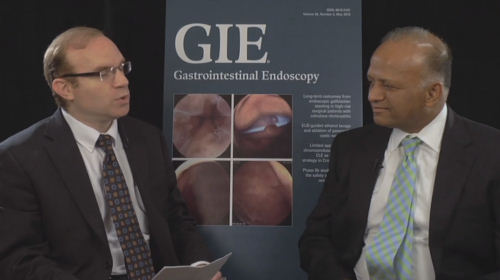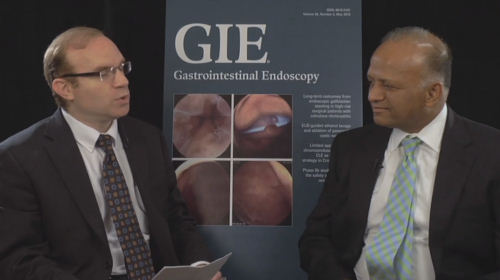
DOWNERS GROVE, ILL. – July 11, 2016– A look back at more than half a million patient records has established that patients with pancreatic cysts have a significantly higher overall risk of pancreatic cancer compared to those without such cysts, according to a study in the July issue of GIE: Gastrointestinal Endoscopy, the journal of the American Society for Gastrointestinal Endoscopy (ASGE).
Certain types of pancreatic cysts (such as mucinous neoplasms) are known to have malignant potential based on their form or structure. Surveillance (watching) or surgical resection (removal) are possible ways to manage these. But other types of cysts do not fit the “potentially malignant” profile at the time they are detected (described as “morphologically benign”). Because previous studies did not follow patients for more than two years, experts have not known what the overall long-term risk is for developing pancreatic cancer in patients with cysts.
The study, “Risk of pancreatic cancer in patients with pancreatic cyst,” looked at the history of patients in the Veterans Health Administration database, examining all patient encounters from October 1998 through September 2007. They included 520,970 patients, 755 of whom were diagnosed with pancreatic cysts. The study did not differentiate among different types of pancreatic cysts.
After adjusting for age, race, smoking and alcohol use, which are independent risk factors for pancreatic cancer, the researchers followed the history of patients with and without pancreatic cysts from the time of cyst diagnosis to the time of cancer diagnosis. Those who did not develop cancer were followed until the end of the study or until they were lost to follow-up.
In the group with cysts, 17 of the 775 patients were diagnosed with pancreatic cancer over the time period of the study. Of those, five were diagnosed with cancer within one to two years of the cyst diagnosis; six patients within two to four years; and three within four to six years. The remaining three patients were diagnosed with pancreatic cancer within six to eight years of their cyst diagnosis.
In the large group of patients without cysts, 1,206 out of 520,415 were eventually diagnosed with pancreatic cancer. The mean age of patients diagnosed across both groups was 62 years, 11.5 months.
The overall risk of pancreatic cancer was estimated to be 19.64 times greater in the group with pancreatic cysts.
Pancreatic cysts that have not produced symptoms are being detected more frequently in patients as a result of increased use and improved quality of abdominal imaging ordered for various reasons. Prevalence of pancreatic cysts as an incidental finding on magnetic resonance imaging (MRI) was reported to range from 2.4 percent to 19.6 percent in two studies from 2010. Surgery is performed in only a small fraction of patients with pancreatic cysts.
The authors noted the need for future studies to evaluate the risk of pancreatic cancer in patients with documented mucinous cysts, based on cyst size and patient age, to help create appropriate strategies for diagnostic evaluation and management.
###
To see a video interview with the author, Dr. Banke Agarwal, visit http://www.giejournal.org/content/video_interviews
Editor’s Note: ASGE has published a related guideline in the July issue of GIE: Gastrointestinal Endoscopy, entitled “The role of endoscopy in the diagnosis and treatment of cystic pancreatic neoplasms. The role of endoscopy in the diagnosis and treatment of cystic pancreatic neoplasms.” http://www.giejournal.org/article/S0016-5107(16)30060-8/abstract
About Gastrointestinal Endoscopy
Gastrointestinal endoscopic procedures allow the gastroenterologist to visually inspect the upper gastrointestinal tract (esophagus, stomach and duodenum) and the lower bowel (colon and rectum) through an endoscope, a thin, flexible device with a lighted end and a powerful lens system. Endoscopy has been a major advance in the treatment of gastrointestinal diseases. For example, the use of endoscopes allows the detection of ulcers, cancers, polyps and sites of internal bleeding. Through endoscopy, tissue samples (biopsies) may be obtained, areas of blockage can be opened and active bleeding can be stopped. Polyps in the colon can be removed, which has been shown to prevent colon cancer.
About the American Society for Gastrointestinal Endoscopy
Since its founding in 1941, the American Society for Gastrointestinal Endoscopy (ASGE) has been dedicated to advancing patient care and digestive health by promoting excellence and innovation in gastrointestinal endoscopy. ASGE, with more than 14,000 members worldwide, promotes the highest standards for endoscopic training and practice, fosters endoscopic research, recognizes distinguished contributions to endoscopy, and is the foremost resource for endoscopic education. Visit http://www.asge.org and http://www.screen4coloncancer.org for more information and to find a qualified doctor in your area.
Media Contact
Gina Steiner
[email protected]
630-570-5635
http://www.asge.org
The post Study sheds light on true risk for pancreatic cancer in patients with cysts appeared first on Scienmag.





